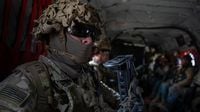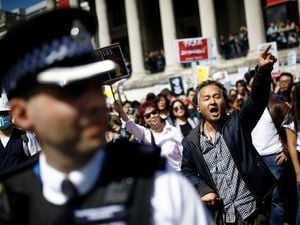In a significant military operation on July 25, 2025, U.S. forces conducted a rare and targeted raid in the Aleppo province of northwestern Syria, successfully killing a senior Islamic State leader, Dhiya’ Zawba Muslih al-Hardani, along with his two adult sons, Abdallah Dhiya al-Hardani and Abd al-Rahman Dhiya Zawba al-Hardani. The raid, overseen by the United States Central Command (CENTCOM), marked a continued commitment to combating ISIS despite ongoing shifts in U.S. policy toward Syria.
The operation unfolded in Bab, a district within Aleppo Governorate, and was part of a broader counterterrorism effort that has persisted since the rise of ISIS in the region. Although the terrorist group lost its last stronghold in Syria in 2019, it remains a persistent threat. CENTCOM described the three men as posing a direct danger not only to U.S. and coalition forces but also to Syria's new government, which has been striving to stabilize the war-torn country following the ousting of long-time dictator Bashar al-Assad in December 2024.
Central Command's statement highlighted that the raid was executed without casualties among U.S. forces, and notably, three women and three children present at the location were unharmed. This detail underscores the precision and care taken during the operation, which likely involved helicopter-borne Special Operations commandos supported by attack aircraft and drones—an approach that, while riskier than airstrikes alone, allows for the capture of valuable intelligence materials such as computers and cellphones that can inform future missions.
General Michael Erik Kurilla, head of CENTCOM, emphasized the relentless nature of the fight against ISIS. "We will continue to relentlessly pursue ISIS terrorists wherever they operate," he said. "ISIS terrorists are not safe where they sleep, where they operate, and where they hide. Alongside our partners and allies, U.S. Central Command is committed to the enduring defeat of ISIS terrorists that threaten the region, our allies, and our homeland." His words reflect a steadfast military posture amid evolving geopolitical dynamics in the Middle East.
The raid comes at a time of notable shifts in U.S. policy toward Syria. In late June 2025, President Donald Trump signed an executive order lifting most U.S. sanctions on Syria, effectively ending decades of American restrictions. This move followed a surprise announcement in May during a visit to Saudi Arabia, where Trump criticized interventionist policies and expressed support for Syria's new leadership under President Ahmed al-Shara. Al-Shara, who assumed power after leading a rebel group once affiliated with al-Qaeda, was described by Trump as "young, attractive," and "tough," signaling a controversial but strategic embrace of Damascus's new government.
These developments are part of a broader recalibration of U.S. involvement in Syria. Earlier in April 2025, the Pentagon announced plans to withdraw approximately 1,000 troops, halving the American military presence in the country from around 2,000 personnel stationed across eight bases. Hundreds of troops have already returned home, reflecting a shift toward a more limited but focused engagement in the region.
In parallel with military actions, diplomatic efforts have also intensified. On the same day as the raid, Syria's Foreign Ministry announced meetings with American and French officials aimed at reinforcing cooperation in the fight against terrorism. The statement underscored a mutual interest in strengthening the Syrian government's capacity to address security challenges through state institutions, signaling a potential opening for increased collaboration despite the country's complex and troubled history.
Counterterrorism analysts, such as Colin P. Clarke of the Soufan Group, suggest that publicizing the raid serves multiple purposes. It demonstrates the ongoing commitment of the U.S. and its partners, including Turkey and Syria, to combat ISIS. It also highlights tangible progress by the Damascus government in addressing extremist threats, a key demand from Washington as it cautiously engages with Syria’s new leadership.
While the identities and specific roles of Dhiya’ Zawba Muslih al-Hardani and his sons within ISIS remain undisclosed, their elimination is considered a significant blow to the terrorist network's operational capabilities in the region. The U.S. military's willingness to conduct ground raids, despite the inherent risks, reflects the importance of disrupting ISIS leadership and gathering intelligence that could prevent future attacks.
This operation also illustrates the complex balancing act faced by U.S. policymakers: pursuing counterterrorism objectives while navigating a shifting political landscape marked by the withdrawal of troops, easing of sanctions, and cautious engagement with a government once linked to extremist groups. The raid in Aleppo underscores that, even amid these changes, the fight against ISIS remains a priority.
As the situation in Syria continues to evolve, the U.S. military's approach appears to be one of targeted precision strikes combined with diplomatic overtures aimed at stabilizing the region. The recent raid serves as a stark reminder that, despite territorial losses, ISIS and affiliated groups continue to pose a threat that demands vigilance and sustained action.
In the words of General Kurilla, the message is clear: "ISIS terrorists are not safe where they sleep, where they operate, and where they hide." The U.S. Central Command’s commitment to the enduring defeat of ISIS remains unwavering, signaling ongoing military and strategic efforts to protect regional stability and national security interests.





